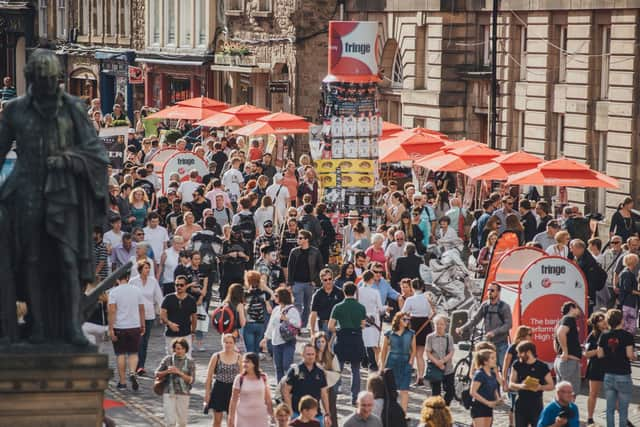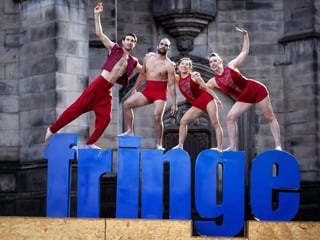Edinburgh's festivals admit action needed on crowd congestion as they distance themselves from 'growth for growth's sake'
and live on Freeview channel 276
Julia Amour, director of government-funded organisation Festivals Edinburgh, called for the introduction of measures to make the city centre more “people friendly”, ease traffic congestion and tackle pollution, as well as a clampdown on “unregulated short-term lets” in the face of growing numbers of visitors to the city.
Ms Amour, who represents events like the International Festival, Fringe and Tattoo, said there was a need for “constant reinvention” of the festivals and insisted that “growth for growth’s sake is not our agenda.”


Advertisement
Hide AdAdvertisement
Hide AdHowever Ms Amour said there was a need for the city to “come together” to tackle areas of concern,” insisting “polarised views won’t help find workable solutions.”
There has been growing concern about the impact of “overtourism” in Edinburgh during peak periods, with the city named alongside Amsterdam, Rome, Venice and Barcelona as one of the world's worst hotspots last year.
An official report for the tourism industry, published last summer, called for the growth of the city’s festivals and events to be “carefully managed” in future to reduce the risk a “tipping point” being reached over the way taxpayers feel about visitors.
Writing in The Scotsman, Ms Amour said there was resounding evidence of public support for the city’s festivals, which now attract more than an overall audience of 4.5 million each year and are worth more than £313 million to the city's economy.
Advertisement
Hide AdAdvertisement
Hide AdShe pointed out that two thirds of the city’s population get involved in Edinburgh’s festivals each year - roughly double the number who go to theatre, live music evens, museums or art galleries when festivals are not running.
However she added: "The festivals’ ability to connect people and ideas at local, national and international levels is an asset that will stand Edinburgh and Scotland in good stead as we enter uncertain times after Brexit.
"However, they also need constant reinvention, especially if we are to continue to inspire the next generation and ensure the festivals have something of benefit to offer to everyone.
“For the festivals, growth for growth’s sake is not our agenda. Our focus is to ensure that Edinburgh is a place of great cultural discoveries and experiences from home and abroad.
Advertisement
Hide AdAdvertisement
Hide AdBut the figures show that Edinburgh is a popular and growing city, and that brings an increased need to manage impacts."
However key thoroughfares such as George IV Bridge and the Bridges are said to have been made “worse than ever” due to increased traffic congestion and more overcrowding on pavements.
Ms Amour said: “We must find ways to manage flows of people and traffic better. We’re strongly supportive of measures to make the streets and public spaces much more people-friendly for pedestrians, through managing the city centre while reducing pollution and congestion to keep traffic moving.
"Festivals are working with city planners, transport providers and researchers to help map flows of people around the city during peak times.
Advertisement
Hide AdAdvertisement
Hide Ad“As with other attractive global cities, the tourism and population growth has been accompanied by a rapid increase in unregulated short-term lets all year round. Such developments have led to a shift in city centre housing patterns and concerns about those communities being able to thrive.
"So it’s an important step forward that the city will soon have new legal powers to manage short-term lets to ensure Edinburgh’s unique character is secured.
“Now is the time to map out how Edinburgh can protect and enhance our city and its festivals for the future.
"The issues we face can’t be approached in isolation, which is why partnership-working with organisations and residents across the city is so important and why we will use the festivals’ networks to get people talking together."
Advertisement
Hide AdAdvertisement
Hide AdCammy Day, deputy leader of the city council, said: “Clearly, our reputation as a world-renowned, historic and unique festival city is not without its challenges.
"There is no doubt that Edinburgh loves its festivals but, as Julia Armour says, we need to come together to tackle the issues our city’s extreme popularity poses.
“That’s why we’re continuing to work closely with Festivals Edinburgh and a whole range of cultural, heritage, tourism and community organisations to explore ways of improving the sustainability of our festivals, ensuring quality of life for residents and protecting the city’s heritage.
"We’re already adapting our approach to traffic and people management to create a safer, more welcoming atmosphere for all those who live and visit here.
Advertisement
Hide AdAdvertisement
Hide Ad“This, of course, is part of a broader, long-term vision for our city. Central to this is our work with the Scottish Government to address the rise of short term lets, our own plans to build thousands of affordable homes over the coming years, our ambitious carbon zero targets and the need for smart city technology to help inform our decisions.
"Only if we think holistically will we deliver a festival city that future generations will thank us for.”
